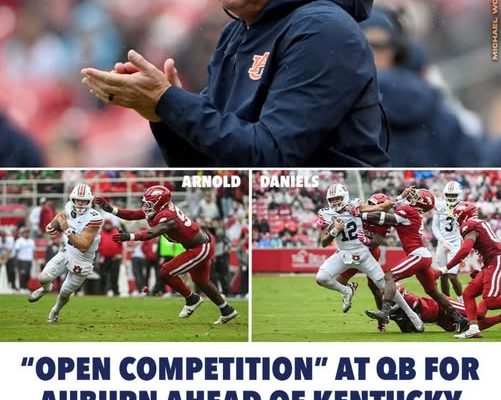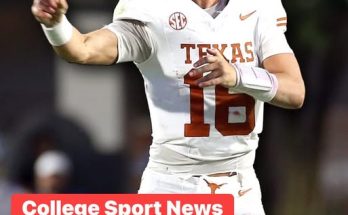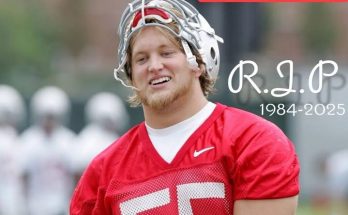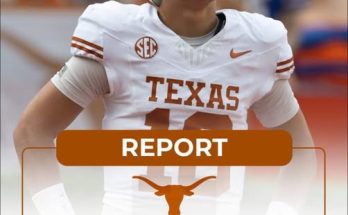Auburn football finds itself at a pivotal juncture as the Tigers prepare for their upcoming showdown with Kentucky. The spotlight is squarely on the quarterback position, where head coach Hugh Freeze is facing a critical decision between Ashton Daniels and Jackson Arnold. The choice of starting quarterback is never a minor consideration in college football, and in Auburn’s current context, it carries extra weight. Daniels stepped into the spotlight during Saturday’s game against Arkansas, replacing Arnold mid-contest and guiding the team to a victory. His performance has sparked debate among fans, analysts, and coaching staff alike, forcing Freeze to carefully evaluate who gives Auburn the best chance to succeed in the high-stakes environment of SEC football.
The quarterback conundrum has been brewing all season. Jackson Arnold, who began the season as the starter, has shown flashes of his considerable talent but has also struggled with consistency and execution under pressure. His ability to read defenses and make adjustments is recognized, yet his performance against Arkansas raised questions about whether he could reliably lead Auburn through the rigors of the SEC. Meanwhile, Ashton Daniels, who was initially seen as a backup, seized his opportunity with poise and efficiency. Stepping into a live game scenario, Daniels displayed the composure, accuracy, and decision-making that have long been hallmarks of elite quarterbacks. His presence ignited Auburn’s offense, creating momentum and delivering results at a critical juncture in the season.
Coach Hugh Freeze has been measured in his comments about the quarterback situation, emphasizing fairness, preparation, and performance. He has underscored that both quarterbacks will share practice reps in the lead-up to the Kentucky game. This approach allows Freeze to evaluate not just raw talent, but also leadership, adaptability, and the mental resilience necessary to thrive in high-pressure situations. It is a strategy that reflects a broader coaching philosophy—one that values readiness and preparation over impulsive decisions. Freeze’s experience navigating quarterback controversies at previous programs gives him a template for balancing talent with team dynamics, but the unique pressures of Auburn’s season add layers of complexity to the decision-making process.
The choice between Daniels and Arnold is about more than individual ability. Auburn’s offense has relied on a mix of dynamic passing and strategic rushing, requiring a quarterback capable of orchestrating multiple facets of the game. Daniels’ recent performance highlighted his ability to read defensive alignments, anticipate pressure, and make split-second adjustments. His comfort in the pocket and willingness to extend plays allowed Auburn to maintain offensive rhythm when the game was on the line. Arnold, on the other hand, brings a deep understanding of Auburn’s offensive scheme and a track record that includes big-game experience. The coaching staff must weigh Daniels’ momentum and apparent confidence against Arnold’s established knowledge and consistency over the course of the season.
The debate extends beyond the technical and into the psychological realm. Confidence, leadership, and team chemistry are critical components of quarterback play, especially in a program with high expectations like Auburn. Teammates respond to a quarterback who inspires belief, maintains composure under pressure, and leads by example. Daniels’ recent display has undoubtedly bolstered his credibility in the locker room, while Arnold’s experience and prior leadership also command respect. Freeze must consider how each quarterback’s approach influences the overall energy of the team, the execution of the game plan, and the response to adversity on the field.
Media and fan reaction has added another layer of scrutiny to the decision. Auburn supporters are intensely invested in the quarterback question, with opinions divided between those advocating for continuity and those pushing for the momentum Daniels has generated. Analysts dissect film, highlighting each quarterback’s strengths and weaknesses. Daniels is praised for his poise, quick decision-making, and ability to thrive under pressure, while Arnold is recognized for his understanding of the offense, accuracy, and leadership qualities. The conversation around the quarterback spot reflects a broader narrative about Auburn’s identity this season—whether the team will lean into bold moves and fresh talent or trust the established framework that has guided them thus far.
The SEC environment amplifies every decision, with games often decided by a single play or a moment of clarity under pressure. Kentucky, Auburn’s next opponent, represents a significant challenge that will test both quarterbacks’ readiness. The Wildcats are known for disciplined defensive schemes, a mix of speed and power at skill positions, and a capacity to capitalize on mistakes. The quarterback who starts will need to manage the game effectively, make precise throws, and adjust to defensive adjustments in real-time. The stakes of the matchup intensify the need for careful evaluation by the coaching staff, as a misstep at the quarterback position could have season-defining consequences.
Historical precedent also informs Freeze’s decision. Many coaches in college football have faced similar dilemmas, balancing the potential of a rising star against the reliability of a seasoned starter. The risk-reward calculus is delicate: inserting a new quarterback can inject energy and unpredictability into an offense, but it also introduces the potential for miscommunication, mistakes, and pressure-induced errors. Conversely, sticking with the established quarterback maintains continuity but may limit the team’s ceiling if the starter is not performing at an optimal level. Freeze’s measured approach, allowing both quarterbacks to compete in practice, mirrors successful strategies employed by coaches who prioritize readiness, performance metrics, and team buy-in over reactive decisions.
The tactical elements of the matchup with Kentucky will further influence the quarterback decision. Daniels’ mobility and improvisational skill set could exploit defensive vulnerabilities, creating opportunities in both the passing and running game. Arnold’s pocket presence and command of the playbook could ensure disciplined execution against a structured defensive scheme. The coaching staff will analyze film, review tendencies, and consider matchup dynamics to determine which quarterback’s skill set aligns with the anticipated challenges. This level of preparation underscores the intricate planning involved in quarterback selection, where even minor differences in style, timing, or decision-making can have significant impacts on game outcomes.
Player development also plays a role in Freeze’s calculus. Daniels’ recent exposure to game action provides a foundation for growth, allowing him to gain experience, confidence, and familiarity with live defensive adjustments. Arnold’s sustained play over the season has already established his rapport with teammates and comprehension of game flow. Balancing the long-term development of Daniels with the immediate needs of the team adds a layer of complexity, as Freeze must weigh both current performance and future potential. This dual focus reflects a broader coaching philosophy, emphasizing both present competitiveness and sustainable program success.
Team dynamics extend beyond the quarterback room. Offensive linemen, receivers, running backs, and tight ends all adjust their play based on the quarterback’s tendencies and decision-making style. Daniels’ arrival in the starting role could shift timing, route execution, and blocking schemes, while Arnold’s continuity ensures familiarity and rhythm. Coaches must consider the holistic impact on the offense, understanding that the quarterback choice reverberates throughout the unit. Success hinges on cohesion, communication, and the ability of the entire offensive unit to operate in harmony under pressure.
The psychological dimension of competition between quarterbacks should not be underestimated. Healthy competition can elevate performance, foster accountability, and stimulate preparation, but it also requires careful management to avoid division or morale issues. Freeze’s strategy of sharing reps and assessing practice performance encourages both quarterbacks to perform at their best while maintaining a sense of fairness. By evaluating leadership, resilience, and on-field execution in real-time, Freeze can make a decision that optimizes team performance without creating unnecessary tension.
Fans and analysts will continue to scrutinize every practice session, every rep, and every performance leading up to the Kentucky game. Social media amplifies opinions, with instant reactions to highlights, stats, and commentary shaping public perception. For Freeze, navigating this landscape requires a balance of transparency, discretion, and confidence in his evaluation process. Public opinion may sway, but the final decision rests on a careful assessment of who can give Auburn the best chance to win in a highly competitive environment.
Auburn’s history adds context to the quarterback discussion. The program has seen periods of transition, moments of brilliance, and high-pressure games where quarterback play defined outcomes. Previous coaches have faced similar dilemmas, and lessons learned from past decisions inform current strategy. Daniels’ emergence reminds the program of the importance of readiness and opportunity, while Arnold’s established presence underscores the value of consistency and experience. Freeze’s task is to navigate this historical awareness while making a decision tailored to the team’s current realities.
Off-field factors also contribute to the quarterback decision. Team chemistry, work ethic, and off-field leadership play essential roles in sustaining success throughout the grueling SEC schedule. Daniels’ approach to preparation, ability to inspire teammates, and adaptability under pressure complement his on-field skills, while Arnold’s track record reflects a commitment to consistency, accountability, and leadership. The intersection of talent, character, and performance forms the foundation of Freeze’s evaluation, emphasizing that quarterback selection is about more than athletic ability—it is about fostering a culture of excellence and resilience.
Ultimately, Freeze’s decision will signal the team’s direction and philosophy for the remainder of the season. Selecting Daniels may indicate a willingness to embrace momentum, capitalize on emerging talent, and inject energy into the offense. Choosing Arnold could signify confidence in experience, continuity, and the mastery of the existing game plan. Both choices carry inherent risk and opportunity, reflecting the nuanced reality of coaching at the highest levels of college football. Freeze’s challenge is to align the quarterback selection with Auburn’s broader goals, strategic priorities, and competitive aspirations.
As Auburn prepares for Kentucky, the quarterback debate will continue to captivate fans and pundits alike. Daniels’ recent performance has proven that he can rise to the occasion, while Arnold’s experience provides a stabilizing force that cannot be overlooked. Freeze’s approach of shared reps and careful evaluation ensures that the decision is informed, deliberate, and focused on maximizing team performance. The ultimate choice will shape not only the upcoming game but also the trajectory of Auburn’s season, influencing momentum, confidence, and the program’s competitive edge in the SEC.
The situation encapsulates the challenges inherent in modern college football coaching, where decisions are influenced by performance data, psychological insight, team dynamics, and public scrutiny. The quarterback position, in particular, serves as a microcosm of leadership, strategy, and accountability. Daniels versus Arnold is more than a positional question—it is a test of decision-making, preparation, and the ability to balance short-term needs with long-term vision. Hugh Freeze’s handling of this dilemma will be scrutinized, debated, and remembered as a defining moment in Auburn’s season.
As the Tigers approach the Kentucky game, anticipation is high. The quarterback who takes the first snap will carry the hopes and expectations of a passionate fan base, a competitive team, and a storied program seeking success in one of the most demanding conferences in college football. Freeze’s decision will reflect a careful weighing of performance, potential, leadership, and strategic alignment, encapsulating the essence of coaching at the highest level. Whether Daniels or Arnold emerges as the starter, Auburn’s season hinges on the quarterback’s ability to execute, inspire, and navigate the challenges ahead with poise and skill.
In the end, the quarterback dilemma at Auburn is emblematic of the high-stakes environment of college football, where split-second decisions, preparation, and leadership converge to define outcomes. Hugh Freeze’s measured approach, emphasizing evaluation, competition, and readiness, positions the team to make the most informed choice. Daniels and Arnold represent two different pathways, each with potential rewards and risks, and the decision will resonate throughout the program. For Auburn fans, the anticipation, debate, and eventual outcome add drama, intensity, and meaning to a season where every play matters and every decision carries weight.
The matchup with Kentucky will be more than a test of skill—it will be a measure of coaching acumen, quarterback readiness, and team cohesion. As Freeze navigates the decision, the focus remains on maximizing Auburn’s performance, sustaining momentum, and positioning the team for success in a highly competitive SEC landscape. The choice between Ashton Daniels and Jackson Arnold is central to that objective, reflecting the complex, multifaceted nature of leadership, strategy, and competitive excellence in college football. In the weeks ahead, the Tigers’ quarterback decision will unfold as both a narrative of opportunity and a defining moment in Auburn’s pursuit of victory.



